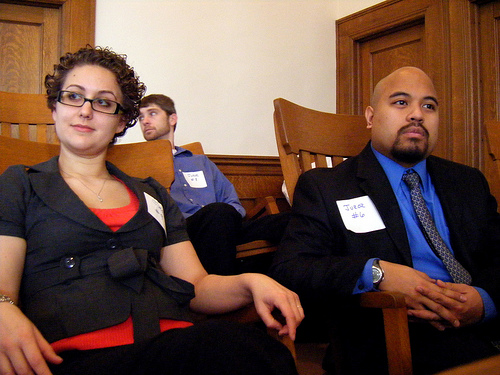After finally getting your case to trial, you are locked, ready and loaded for sweet victory. Your fact and expert witnesses are ready to go, your exhibits are pre-marked and stipulated into evidence and you are certain the jury will soon reward you with a great plaintiff’s verdict. You are confident the case is close to a sure-thing.
During closing argument, the jurors seem to be fixed on every word from your mouth and leaning forward in their chairs. The jurors look at the ground when the sinister defense lawyer gives his closing argument. You sense victory.
What happens next is mind-blowing. The jury returns with a unanimous verdict AGAINST your case. You are stunned by the defense verdict and ready to stomp out of the courtroom as soon as you can. But hold on for a second: instead, you decide to confront the jurors and find out how they arrived at the ridiculous verdict against your case.
What you discover is that the jurors didn’t like the way your client dressed, or they thought she didn’t really need the money to compensate for her injuries because her husband has a good paying job at IBM. The list of irrational and arbitrary reasons for a jury’s verdict is endless (this is why I ask for bench trials and I ask my clients to waive a jury trial). You leave the courtroom even angrier than the moment the jury’s verdict was announced and you consider changing careers or living the rest of your life as a Tibetan monk.
Is this situation hopeless? Is there a way to get inside the minds of the jurors to discover how they think before your trial begins?
There is hope.
My First Focus Group: A Real Eye-Opener
In 1996, I wandered into a room full of strangers while I am an associate attorney at Powers & Santola in Albany. At first, I thought I happened into a séance or a meeting of cult members. After collecting myself, I learned that the strangers in the room were there to participate in a “focus group”. Having no knowledge of focus groups (hell, I didn’t even know what the term meant), I stayed and watched. That day I got an indoctrination into focus groups and the powerful insights they give into the minds of jurors.
After my first focus group, I learned everything I could about focus groups and began using them for every case that I had. In complex cases, I held two to three focus groups as they got close to trial. What I learned was nothing short of amazing.
You see, just like most young and inexperienced lawyers, I believed in the collective wisdom of the jury at that point in my career and that a jury will always pay careful scrutiny to the facts and evidence and do justice for all parties. However, as I began trying cases, I realized that most jurors do not care about our cases and they are often more concerned about what they are going to eat for dinner than the testimony presented at trial.
Focus groups revealed shocking insights about the arbitrary and capricious way that jurors think. As a trial lawyer, we focus on the basic elements of proof, namely, negligence, causation and damages, and the presentation of witnesses at trial is carefully orchestrated to prove our case. Jurors don’t think that way (if you don’t believe me, rent the DVD, “Twelve Angry Men”—it’s a classic).
Painful Lessons from a Crazy Jury (and what I did about it)
At focus groups, jurors will give you insights to the strengths and weaknesses of your case that you never dreamed of. In 2001, I handled a drowning case involving the deaths of two children, ages 5 and 8, who tragically drowned in the Hudson River while being watched by a babysitter. The mother of the two children was in the Bronx at the time of the accident at a Yankees’ game. The negligence of the babysitter and the owner of the public park was overwhelmingly strong and I was convinced that victory was in my sights. Little did I know.
The jurors at my first focus group ripped the plaintiff/mother to shreds for attending a Yankees’ game on the day of her children’s death. Legally, the reason for the mother’s trip to the Bronx had no relevance on the liability issues against the babysitter or the owner of the public park. But “legal relevance” mattered little to the jurors in the focus group, who refused to even consider the negligence of the babysitter or public park. This was a real eye-opener.
At my second focus group on the same case, I tweaked the facts a little. Instead of going to the Bronx for a Yankees’ game, I told the jurors at the second focus group that the plaintiff/mother was in the Bronx to visit her dying mother in hospice care. Now, the jurors were sympathetic to the mother and turned their venom on the babysitter and park owner (where I thought they would be focused from day one). The jurors in the second focus group found overwhelmingly in favor of the plaintiff/mother.
What seemed meaningless to me as the case got close to trial meant everything in the world to the jurors. Great, but how can you use this insight into the minds of the jurors? In a motion in limine, I asked the Court to prohibit any evidence or testimony as to the reasons for the plaintiff/mother’s trip to the Bronx on the day of the accident. The Court agreed that such evidence was irrelevant to the liability issues and the Court prohibited the defense lawyer from introducing the evidence at the trial. Catastrophe averted!
